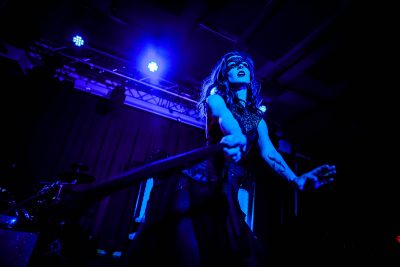Light-up shoes, lace, velvet and wings adorned the crowd lined up in front of the Middle East Restaurant and Nightclub in Cambridge Feb. 13. They awaited the opening of “The Poetry Brothel: Lupercalia” — an intimate night of burlesque, mysticism and of course, poetry.

The Poetry Brothel describes itself as an “immersive literary cabaret,” combining poetry, live music, art and magic, according to its website. Inspired by early 20th century brothels across the world, the Poetry Brothel presents poets and artists who perform as different eccentric characters.
For their show in Cambridge, the Brothel transformed The Middle East into a mystical venue heralding to days past, making clear to attendees that the night would be rooted firmly in escapism.
The frigid weather did little to quell spirits as long-time fans discussed past routines and which performers they hoped would make an appearance again. First-timers seemed to listen closely to absorb others’ knowledge in hopes of navigating the night.
Though newbies took their cues from old-timers, the hosts of the Brothel — Stephanie Berger, who played “The Madame,” Charley Layton, who played “Mister Charley,” and Nicholas Adamski, who played “Tennessee Pink,” — expertly led viewers through an overview of the night.
The theme of the performance was Lupercalia: a violent and sexually charged ancient Roman holiday meant to ward off evil spirits. Some historians believe some Valentine’s Day traditions are derived from the holiday. However, Lupercalia took on new purposes at The Brothel.
Lupercalia was adapted by the performers as the antithesis of Valentine’s Day. For all the purity of romantic love that Valentine’s Day is meant to celebrate, here Lupercalia seemed to celebrate the darker undersides.
Each of the nine poets, called “poetry whores,” took on a persona for the night before reciting a few verses.
One such persona was “Velvet Envy,” who “entered this world insidiously, cloaked in the deep green of midnight jealousies,” according to her character biography. Another was “Tempest Amora,” a woman who, according to her character biography, died from a broken heart and “like the manic fires of Hades, beacons and begs for wild passion to remove her from the shadows.”
If patrons wanted to hear more from a certain poet, they could use a token, the night’s form of currency, to receive a private reading from one of the performers.
With a name like “The Poetry Brothel,” risqué poetry was to be expected, but the performers offered insight on a variety of topics.
The audience was receptive of the range of topics each poet delivered, nodding in solidarity as one poet detailed how she escaped a toxic relationship. Another used a poem to detail her frustration with censorship.
The night wasn’t all PG — while most characters only read poetry, the audience also watched burlesque dances by LunaLupa and Kimmy Moore, which were well-received by the audience, as was the pole-dancing aerialist Lili Mitchell.
An important facet of the night was the rejection of heteronormative standards. The Brothel emphasized the importance of embracing all those who graced it, a value that was extended to both the audience and the performers.
Performers of all ethnicities and gender identities were welcomed, without having these identities exploited for shock value or performative inclusion.
Rather than using the traditional term “ladies and gentlemen,” Mister Charley used “dearies and lovelies” to address the audience due to his disapproval of binary terms. Body types of all kinds were freely on display, beyond just the traditional hourglass with which burlesque performers are traditionally associated.
A genderqueer poet discussed their past romances, and scattered throughout The Middle East were buckets for donations to the organization Gays and Lesbians Living In a Transgender Society, which funds protection for transgender sex workers.
In between performances, spectators were kept entertained by the antics of Mister Charley and Tennessee Pink, who were rife with raunchy jokes that held no hints of offense.
Attendees were also free to browse the handmade jewelry made by artisans or have their portraits drawn by sketch artists. Additionally, palm and tarot readings were available and energy healers offered to “unblock chakras.”
After four hours of debauchery, the event began to wind down as the clock approached midnight. As technicians unraveled the scene in front of me, I quietly slipped out in an attempt to preserve the magic I had just witnessed.
























































































































